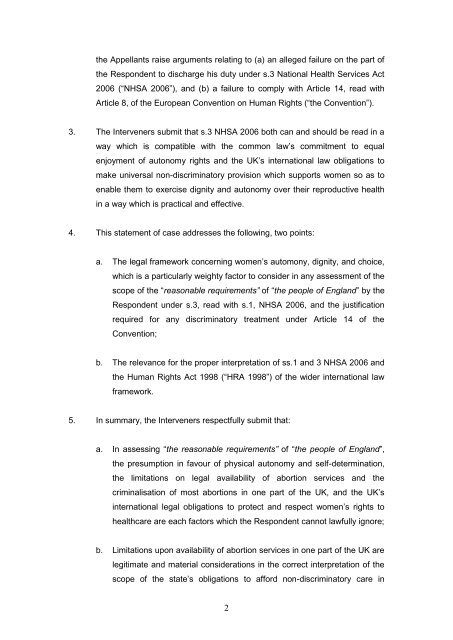interveners-statement-of-case-final
interveners-statement-of-case-final
interveners-statement-of-case-final
You also want an ePaper? Increase the reach of your titles
YUMPU automatically turns print PDFs into web optimized ePapers that Google loves.
the Appellants raise arguments relating to (a) an alleged failure on the part <strong>of</strong><br />
the Respondent to discharge his duty under s.3 National Health Services Act<br />
2006 (“NHSA 2006”), and (b) a failure to comply with Article 14, read with<br />
Article 8, <strong>of</strong> the European Convention on Human Rights (“the Convention”).<br />
3. The Interveners submit that s.3 NHSA 2006 both can and should be read in a<br />
way which is compatible with the common law’s commitment to equal<br />
enjoyment <strong>of</strong> autonomy rights and the UK’s international law obligations to<br />
make universal non-discriminatory provision which supports women so as to<br />
enable them to exercise dignity and autonomy over their reproductive health<br />
in a way which is practical and effective.<br />
4. This <strong>statement</strong> <strong>of</strong> <strong>case</strong> addresses the following, two points:<br />
a. The legal framework concerning women’s automony, dignity, and choice,<br />
which is a particularly weighty factor to consider in any assessment <strong>of</strong> the<br />
scope <strong>of</strong> the “reasonable requirements” <strong>of</strong> “the people <strong>of</strong> England” by the<br />
Respondent under s.3, read with s.1, NHSA 2006, and the justification<br />
required for any discriminatory treatment under Article 14 <strong>of</strong> the<br />
Convention;<br />
b. The relevance for the proper interpretation <strong>of</strong> ss.1 and 3 NHSA 2006 and<br />
the Human Rights Act 1998 (“HRA 1998”) <strong>of</strong> the wider international law<br />
framework.<br />
5. In summary, the Interveners respectfully submit that:<br />
a. In assessing “the reasonable requirements” <strong>of</strong> “the people <strong>of</strong> England”,<br />
the presumption in favour <strong>of</strong> physical autonomy and self-determination,<br />
the limitations on legal availability <strong>of</strong> abortion services and the<br />
criminalisation <strong>of</strong> most abortions in one part <strong>of</strong> the UK, and the UK’s<br />
international legal obligations to protect and respect women’s rights to<br />
healthcare are each factors which the Respondent cannot lawfully ignore;<br />
b. Limitations upon availability <strong>of</strong> abortion services in one part <strong>of</strong> the UK are<br />
legitimate and material considerations in the correct interpretation <strong>of</strong> the<br />
scope <strong>of</strong> the state’s obligations to afford non-discriminatory care in<br />
2


